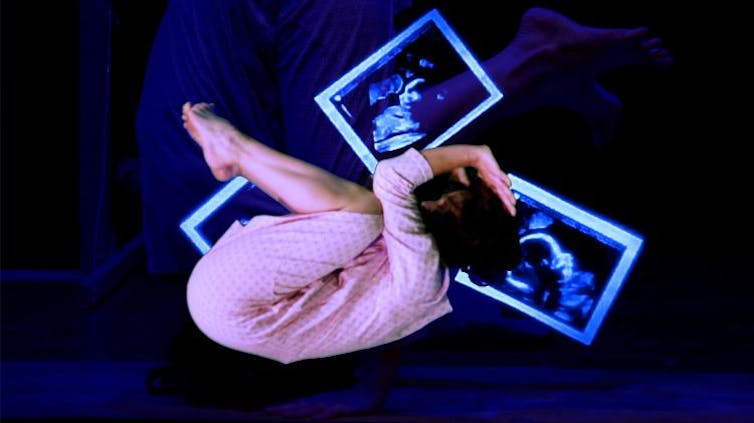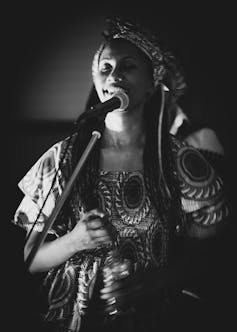Source: The Conversation (Au and NZ) – By Claire Fench, Postdoctoral Research Fellow of multilingual theatre and performance, University of the Witwatersrand
At this year’s Fringe World festival in Perth, the “theatre of the real” is everywhere: theatre, comedy and drag all speak directly to our reality, played against a background of survival.
Real stories provide moments of honesty, introspection and clarity. In bringing true stories to the stage, artists are creating an intense connection between audience and performer.
In a normal year, the festival would play host to artists from across Australia and around the world. With borders closed indefinitely, 42 shows have been cancelled.
The result is a decidedly local festival.
For those of us locked in, it is an opportunity to see ourselves mirrored from the stage, to learn about our neighbours and to delve into how they have navigated their lives.The real makes up for where the news fails
British theatre director Nicolas Kent has said theatre has taken over the role of the news. While this is contentious, theatre audiences grapple with information differently: we want to suspend our disbelief, believe in the hero and hear the full story.
Joe White draws on his own stories as master of ceremonies for stand-up show Best of Africa, presenting gags awash with admiration for his family and community.
White’s open door to his past invites us into the living rooms of communities a few suburbs over, something the news often does with undulating fear.
My mates in Melbourne were saying to me “You have to isolate for 14 days by yourself in a four-star hotel – you are going to hate it!” And I responded with “as an ex-Ethiopian refugee, I’m pretty sure I’m gonna love it!”
White reflects honestly and with humility, pausing comfortably to make his audience feel seen. Vulnerability is at the heart of his performance, and feels like a measure of courage.
Ella Randle’s play 28 Grams draws from a similar place of vulnerability. The one-hander covering her battle with anorexia walks us from healthy child to dying adolescent to counter the romanticisation of the illness in the media.
Actor Georgia Condon tells Randle’s story like it was her own.
It wasn’t the first time I’d been called ugly. The first time was by a girl who told me that her mum thought I was ugly.
The toxicity of this culture is all the harder to digest because of how it rests in Randle’s reality. Although the words are spoken by Condon, our knowledge this story is based on Randle’s life motivates us to listen with open ears. We feel the weight of responsibility for parents in our community who should know better.
Justin Sider’s Dickless similarly blurs the boundaries between artist and character. Sider is trans, and he explores this identity through the story of a man who has lost his penis. Performed in an elevated drag king aesthetic, Dickless is an exploration of trans validity and a rejection of the heteronormative hero’s journey.
While drag performers have traditionally lip synced, Sider sings and raps live, seducing us with resonance and range. By using his real voice, we are brought closer to his body, celebrating his queer and trans identity.
Read more:
‘RuPaul’s Drag Race’ and lip-syncing: A once controversial practice is no longer taboo
The real helps us see ourselves in others
Michelle Hall’s play The Dirty Mother tells her birth story to reframe how childbirth trauma can be dismissed.
When Hall’s son was born, his heart stopped for three minutes. We are held captive by the harsh metal scream of a flatline. We feel the anxiety of waiting for her baby’s heart to start beating again … before it does.

Photo © Megan Hyde and Georgi Ivers
Hall is left in pieces, vomiting uncontrollably into a kidney dish.
Hall’s visceral narrative is performed with imaginative physicality. As she stands on her head, rotating her ankles and flexing her toes, she forms an image of a womb. She transforms into a mooing and chewing cow to the rhythm of Land of Hope and Glory and surrenders her body to the British medical system.
Through Hall’s use of her own body to create these images, she encourages the audience to respect the autonomy of the body found in the act of childbirth.
Marie-Muriel Hillion Toulcanon’s musical theatre show Island Vibrations: from Maloya to Séga travels through the colonised timeline experienced by the people of Réunion Island.
The concert of percussion, dance and story celebrates hybridisation as a cultural strength. As the narrator, Vishwa Hewage tells us:
There is no need to find a meaning to our music and dance: it simply expresses a form of freedom that no one can take away from us.

Photo © Nic Casta
Throughout the show, the audience steps in to dance with the ensemble. Through conflict and celebration, we experience ways to find happiness through adversity.
A-call-and-response with the audience brings me to tears as I am reminded of the performers who have guided me in South Africa. The command of Toulcanon’s voice brings to mind all those I have missed while being separated during the pandemic.
Time and time again at this year’s festival, artists are stripping down to reveal their vulnerability. In the audience, we lean in to offer our understanding.
Unlike the news, theatre of the real tells the stories of yesterday. Next year’s Fringe World will tell of the trials of today.
![]()
Claire Fench does not work for, consult, own shares in or receive funding from any company or organisation that would benefit from this article, and has disclosed no relevant affiliations beyond their academic appointment.
– ref. ‘Theatre of the real’: how artists at Perth Fringe World are stripping down to reveal their vulnerabilities – https://theconversation.com/theatre-of-the-real-how-artists-at-perth-fringe-world-are-stripping-down-to-reveal-their-vulnerabilities-175652







